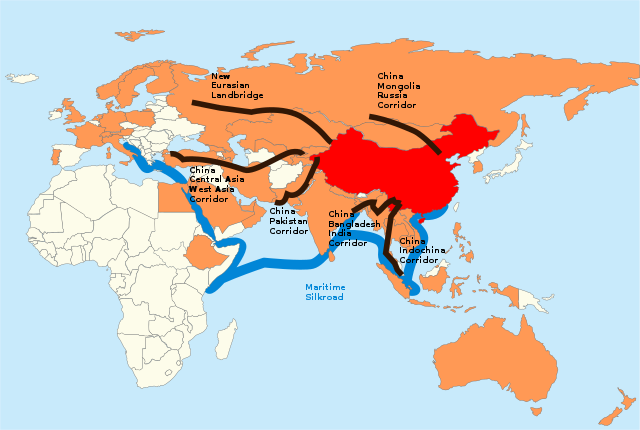It is becoming increasingly clear that the global order is undergoing a major shift, the likes of which haven’t been seen since the beginning of the 20th Century.
Even behind the recent conflict in Ukraine, we have been witnessing the fall of the American Empire, along with the People’s Republic of China’s steady attempts to position itself to replace the United States as the world’s dominant power.
Around the globe, allegiances are shifting in response to the changing geopolitical climate.
It is only natural that as the global order changes, the State of Israel would begin to reassess our geopolitical alliances and weigh our potential strategic and diplomatic options for moving forward.
A most disturbing trend emerging in this arena of Israeli political discourse is the increasing support for reducing Jerusalem’s dependence on Washington by aligning more closely with Beijing.
At first glance, this may seem an obvious solution for distancing ourselves from Uncle Sam – China is America’s fiercest competitor with expanding geopolitical influence. It would, after all, send the message to Washington that Israel will no longer be a de facto vassal to US empire and will act in accordance with our own national interests.
But upon further scrutiny, it becomes evident that a decision to partner with China would not only be counterproductive, but could substantially undermine Israel’s sovereignty in the long run.
This piece aims to explore how deepening Sino-Israeli ties as a strategy for reducing Israel’s dependency on the United States is misguided, morally problematic, and presents risks to both the Jewish state’s security and national sovereignty.
That the State of Israel is today overly dependent on the United States is beyond question. But it is dubious that the strategy of reducing reliance on the current global hegemon by deepening ties with a newer power will result in greater independence. To the contrary, the status quo of dependency would likely be upheld, as the reliance would merely be shifted over to a different power.
The American stranglehold on Israel’s sovereignty is certainly an issue that must be addressed. Swiftly. But in the quest to free ourselves from the US imperial yolk, we can’t afford to hastily enter into partnerships without weighing their implications.
The neocolonial mechanisms through which US imperialism operates have been observed and documented in numerous countries. Its effects have been studied over the course of time. The same cannot be said about Chinese foreign investment.
Unlike American neocolonialism, which generally functions through directly intervening in a country in order to exploit its markets for cheap goods and dominate access to natural resources, China appears to be offering developing nations a new path to economic growth – namely, assistance building critical infrastructure (such as highways, trains, pipelines, mines, ports, information technology infrastructure, etc.).
But what initially presents itself as a desirable option for many nations might in actuality be a new model of neocolonialism wrapped in different packaging.
The Chinese playbook for global dominance is quite different from America’s heavy-handed approach. Instead of outright interventionism in sovereign nations and exerting influence under the guise of human rights, China’s strategy is to stealthily expand its control through the pretense of partnership and a promise of shared economic prosperity. Infrastructure deals are used to debt-trap nations into borrowing money to undertake expensive projects that they can’t afford, and these projects can eventually be turned over to the Chinese government when the country defaults on its debt.
The covert, exploitative nature of Chinese intelligence capabilities and espionage tactics then raises serious security concerns for any national infrastructure provided and overseen by China. These infrastructure projects pose a significant threat to the sovereignty of countries who partake in them.
One only needs to consider what took place in Sri Lanka, where China invested over $1billion to create the Hambantota port. Sri Lanka intended to use the revenue from the project to pay back the debt, but when the investment proved unsustainable, the Sri Lankans were eventually pressured into signing over the entire port to China for 99 years along with 15,000 acres of land.
China gained a port, land, and geopolitical influence, while Sri Lanka’s sovereignty was weakened and the country saw little to no economic benefit.
Rather than accept the notion that China’s interest in infrastructure stems from an altruistic desire to assist other countries in furthering their economic prosperity, we should recognize that Beijing’s foreign infrastructure investments are a vehicle to execute its plan for the Belt and Road Initiative (BRI) – a global infrastructure project which seeks to unite Africa, Asia, and Europe through a network of land and sea trade routes.
The BRI is slated to cost over $26 billion and will affect more than 71 countries. Quite tellingly, the BRI project’s original title, the One Belt One Road Initiative, dropped the word “one” as part of a public relations strategy to convey the message that China’s intention is to work together with – rather than dominate – participating nations.
China’s bid for infrastructure projects in Israel is not an isolated investment move, but rather a strategic implementation of a larger strategy.
Beijing’s flurry of neocolonialist activities and foreign investment strategy inevitably begs the question – how smart is it really for Israel to deepen ties with China? In my assessment, the answer is undeniable: It’s not.
We have already touched on Chinese neocolonialism and debt-trap diplomacy, but the elephant in the room has yet to be fully addressed: China’s stated goal of achieving “The Great Rejuvenation of The Chinese Nation.”
Reestablishing their historic status as a dominant global power is a key driver in every major policy decision made in Beijing. The implication of this axiom is clear – China acts with the sole interest in attaining global power and influence.
Consider for a moment that the Middle East has historically been a focal region for empires desiring influence and control.
In modern history, this is evident by the behavior of the British Empire in the years leading up to renewed Jewish independence, the shifting allegiances during the Cold War era, the present relationship between Israel and the United States, and the vast influence of foreign actors more generally over regional affairs.
Given China’s propensity for disrupting sovereignties by exerting internal political pressure, along with their desire for global dominance, it is not difficult to identify that it is an enormous risk for Jerusalem to enter into such a partnership and willingly allow Beijing direct investment in the Jewish state.
As is, Israel is already overly susceptible to foreign interference and can hardly manage to act in our own best interests under Washington’s restrained-but-firm influence on Israeli policy making. And should China adopt a stronger partnership with Israel, when contradictions between American and Chinese interests in the Semitic Region are inevitably antagonized, this could create yet another internal rift in the Israeli society that we cannot presently afford.
Currently, the Middle East has no shortage of issues. But one problem seems to tower above all others: Iran.
The nuclear and expansionist threat posed by the Iranian regime has been alarming enough to push previously indifferent and even hostile Arab nations to seek out alliances with Israel, an unprecedented occurrence. It follows then, that Iran is no small factor in determining a regional reconfiguration, and therefore must be considered when evaluating the strategic value of aligning with China.
In 2021, China and Iran inked a 25-year cooperation agreement, which has since come into effect, and the details of the deal remain shrouded in secrecy.
In addition, Iran recently participated in a joint naval drill alongside China and Russia in the Indian Ocean. Already, there is enough evidence that China, with mixed loyalties, cannot be a dependable ally for Israel if Iran seeks our destruction.
But the security risks posed by partnership with China is not limited to its relationship to Iran. As previously mentioned, China is infamously proficient at spying, espionage, data harvesting and cybercrime. Permitting Chinese involvement in ANY important national project is in essence an invitation for Chinese intelligence reconnaissance, data theft, and intrusion into state affairs.
In many areas, usually out of necessity, the Israeli state operates under heavy secrecy. It is an invaluable tool for maintaining our sovereignty and responding to security threats. Privacy, therefore, is imperative to our ability to conduct affairs without the knowledge or interference of other nations. Adopting Chinese infrastructure directly threatens that ability.
Aside from concerns over sovereignty, Israel is also a global leader in innovation. Our nation is constantly making significant advancements and creating breakthrough technologies in the fields of medicine, agriculture, military equipment, and of course, high tech, which provides us with a valued edge. It would be unwise to allow for a situation where there is increased possibility for China to steal and copy cutting edge Israeli research and technology.
By now, we’ve well established why aligning with China is not a strategically sound choice for Israel. But cost/benefit analysis is not the only angle to consider here; our status as a Jewish state obligates us to weigh the moral integrity of our actions and partnerships in addition to strategic consideration.
In this regard specifically, there is no room for dispute over the conclusion that Israel cannot align itself with Beijing if we are to determine our actions in accordance with our values.
China is arguably one of the world’s largest human rights violators. In addition to suppressing dissenters and jailing foreign journalists, there is compelling evidence that under Xi Jinping, the CCP has been carrying out an organized, industrial scale genocide against the Uyghurs, a mostly Muslim ethnic Turkic people concentrated mainly in the surveillance state of Xinjiang, formerly East Turkestan.
Not 100 years have passed since the Holocaust, which still lives in the Jewish people’s collective consciousness. Thus, it’s unthinkable that the Jewish state should consider aligning itself with a nation who is accused of orchestrating an eerily similar campaign against another people within its borders.
It is here that we must determine whether the phrase “Never Again” only applies to Jews, or if it is a proclamation that never again shall all of humanity sit by and watch as innocent people designated for extinction undergo unspeakable horrors.
This outlook is often dismissed by questions over the legitimacy of the Uyghur genocide and denial of the possibility that parallels exist between it and the Holocaust. But basic research reveals that there is substantial enough proof to definitively conclude that there exists an ongoing campaign by China against the Uyghurs, and that they are being subjected to heavy and brutal persecution.
Classified internal documents leaked online from within the Chinese government confirm that this campaign of systematic oppression is dictated directly by Xi and other party members. Specific concrete details and figures may not be made available for a long time. Nevertheless, there is no escaping the reality that if we afford ourselves the luxury of indifference to the plight of the Uyghurs, we vindicate the very same indifference shown towards us by the world during our darkest time in Europe.
The mere suspicion of such genocide is by itself enough of a moral conundrum to ascertain that it is wildly inappropriate and borderline blasphemous for Israel to pursue a partnership in any capacity with China until the matter has been resolved.
The argument against aligning with China culminates with a simple fact: Should we choose to finally accept our own power, Israel (and by extension, the Jewish people) finds itself in a position to break free of our servitude to other nations and assume a leading role in the Semitic Region, if not the world.
During our many centuries in exile, Jews attempted to place ourselves in close proximity to those with power as a means of ensuring our survival and protection. Despite the fact that we’re now home and enjoy power as the sovereign nation with a formidable military, we have yet to abandon this tired strategy of aligning ourselves with dominant powers at the expense of our own interests.
As the US Empire begins to collapse, the State of Israel is presented with a choice. Should we find a new global superpower to rely on or should we step into our own power? Aligning with China could potentially allow for our continued survival but assuming the position of a regional power allied to its neighbors is the only way for us to really thrive.
Rather than breaking free of the West only to become a servant of the East, we have a timely opportunity to play by our own rules and focus our energy on creating a new unique system that is authentically Jewish.
The situation in Ukraine should be taken as an official notice that the shift in world order is underway.
Today the State of Israel is more powerful, influential, and prosperous than it has been since being established in 1948. Regional cooperation between Semitic nations is rapidly expanding, and the threat posed by Iran effectively means that regional partnership with Israel is more attractive now than ever before. We are entering into an era where, if we can be bold enough to dream it, the possibility of building a civilization that expresses our true identity and serves as a genuine “light unto nations” isn’t far from reach – provided that we employ wisdom and justice in all our pursuits and, above all, remain true to our core values.
Suffice to say, Israel aligning with China at this juncture in time would be the diplomatic equivalent to shooting ourselves in the foot.






Well-researched and presented. The most important points being that the nation of Israel has evolved into a self-sufficient entity that consistently contributes valued advances to global society. It is time to adopt an identity consistent with that worth.